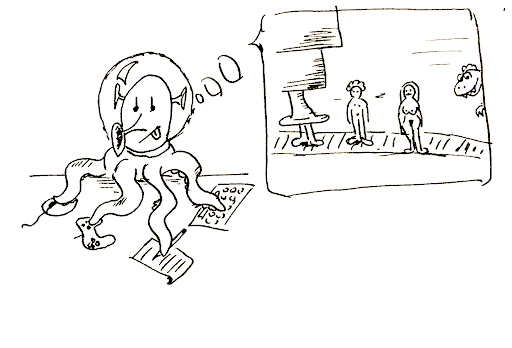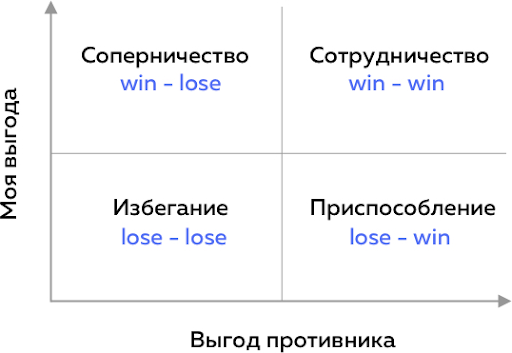How Homo Sapiens conquered the world. Communication and Negotiation Skills
People have the largest brain, and in the process of evolution they were able to develop more skills. Learned to make fire and grow food. But the most important skill that distinguished us from other animals and allowed us to force out other species and to rise to the top of evolution was thinking and communication.
It all started with the world in which we live. There are many theories of the creation of the world.
One of these theories says that the Lord God created all life on earth in 7 days.

Another theory says: the world was created by aliens

The big bang theory seems to be the most rational in my opinion. According to this theory, about 13.5 billion years ago there was a big bang.

As a result of which there appeared matter, energy, time and space. After 300 thousand years from the beginning of its existence, matter and energy began to form between themselves complex complexes — atoms and molecules. After about 4 billion years, the molecules began to coalesce into large and complex structures — organisms.
People — that is, animals from the genus Homo — appeared about 2.5 million years ago as a branch of the more ancient monkey genus Australopithecus.
Today we are only one species - Homo Sapiens, but earlier, according to scientists, there were several species: Homo neanderthalensis, Homo erectus, Homo rudolfensis, Homo ergaster.
We were told in school biology course that all species followed each other, but recently I came across such a theory that many of them existed at the same time, just were different species, like today we have a large number of animal species.
The main difference between Homo Sapiens and other species was the big brain. And for some reason, this part of evolution was the most rewarded. Although it would seem, the ancient people paid very dearly for it. After all, the brain absorbs most of the energy even at rest (up to 25%), and people had to spend more time searching for food, and their muscles were weak. This can be represented as a government that directs money to the development of education, rather than the army, people took energy from their biceps and gave it to neurons. But for some reason it was necessary for evolution, nobody knows.
There are many skills and abilities that people have developed in themselves. For example, they tamed the fire, learned how to grow food. But I want to focus on one of the most important features and skills, why we, Homo Sapiens, ousted others and rose to the top of evolution.
And this skill - thinking and communication. All species of animals on the planet can communicate, they have their own language, for example, ants communicate in a rather complicated way informing each other about food sources, and monkeys are able to warn other relatives about the danger.
But the peculiarity of human language was flexibility. Combining a small number of sounds and gestures into various combinations, we can compose a large number of sentences with a variety of meanings. For example, if monkeys can report: “Caution! A lion! ”, A person can tell his friends that this morning, when he was collecting raspberries by the river, he saw a lion chasing a zebra. A person can clarify all the details: where he saw the lion, when he saw him, what ways you can go to that place. Having received this information, people can draw conclusions on what to do next: chase the lion away and continue the hunt themselves, or wait until it kills, and then chase it away and take the prey.
The example above says that we can perceive, store and transmit information about the world.
Another very interesting feature, and at the same time an advantage, was the difference from all other types - curiosity and gossip. It is not enough for people to know where lions and zebras run, it is much more important for them to find out who in the tribe hates someone, who is sleeping with whom, who is reliable and who is not.
Many animals are also interested in social information, but no one knows how to gossip. Most likely, it was also difficult for other species of our kind to gossip at someone behind their backs.
Today, this skill is usually condemned, but it is very important in forging cooperation in large teams.

Remember this dude, and what heights he reached thanks to gossip (If not, look at the game of thrones).
The development of communication skills and the transfer of information together with thinking, has generated such a property in people as the ability to speak and represent something that does not exist in reality. There were myths, legends, gods and FAITH.
Only a person can believe in something that does not really exist. Try to persuade the monkey to share a banana with you, promising her as many bananas after her death in a paradise for monkeys.
But why is fiction so important? After all, it is misleading, distracting from reality, is it not better to spend precious hours on getting food, fighting enemies or mating?
General mythology gave sapiens an unprecedented ability for flexible cooperation in large teams. Animals also cooperate with large collectives, for example, ants, but they do this according to strict, once and for all set, rules, and moreover only within their “family”. In wolves and chimpanzees, cooperation is based on much more flexible principles, but with only a small number of closely familiar relatives. Sapiens are able to easily cooperate with any number of strangers.
That is why we supplanted other species: thanks to communication, gossip and fiction, Sapiensa could create large communities, hunt together, and not just small families and communities.
Here it is - the power of communication.
In modern society, it is not just the presence of communication skills that is important, but the development of negotiation skills. That is, getting what you want, achieving a goal or resolving disputes through communication.
The word “negotiations” is usually associated with business or diplomacy. But this is not the case; every day we are faced with negotiations: whether it is buying or selling a car, hiring, buying fruit in the market, communicating with my wife when choosing a holiday or choosing wallpaper in the process of repairing an apartment, persuading a child to choose clothes.
Negotiations within the team are also important, because to achieve the goal, you need to perform some actions. Often, when solving tasks, a lead may not be right, and a programmer needs to be able to convey his point of view in order to successfully complete a task - this is also a negotiation skill.
Often, without knowing it, we do not get what we want or do not achieve success because we do not know how to negotiate properly or are afraid of them. We do not want to engage in controversy and once again raise serious topics, we are afraid to say NO, we think everything will be decided on its own or someone will decide for us, and nothing depends on us at all.
It depends and how! Only we ourselves can change something in our lives, both for the better and for the worse.
In any negotiations there are always several outcomes, and more precisely, four or five, when there is a compromise

There are different styles of negotiation to achieve your goal. For example, the most popular is “Harvard style”, or better known as win-win. The bottom line is that the coolest negotiators should think not only about their own benefits, but also try to find a solution that satisfies both parties as much as possible.
But there are those for which there is only win-lose. For example, in his book, Jim Kemp just explains why win-win is bad, and also gives a large number of tips and examples on how to behave in negotiations. Basically, he talks about business negotiations, but these skills can work perfectly in other cases.
Here are some of them:
Never show “need” because it will immediately put you in a losing state, you will start to make wrong decisions, and the other side will see and play on it.
Do not be afraid of failure! In fact, this is the most common fear that makes us give up. But you need to learn to tune in and speak in such a way that you cannot be rejected. And for this the rule works again - there is no need. If you do not need anything from it, the other side will not be able to reject you.
Learn to speak clearly and in the case, you need to eliminate unnecessary chatter, and hold the horses with emotions. Try to stay cold and reasonable if you feel an influx of emotions (excitement, inner turmoil), lower the timbre of your voice, pause, slow down.
But even reading smart books, attending seminars, not each of us can qualitatively defend his position and achieve a successful outcome in negotiations. Since, in addition to knowledge and skills, there is also a psychological component of each individual.
Probably, most of you know the main 4 types of temperament:
Sanguine is a person characterized by high mental activity, such people are balanced and mobile.
Choleric - a person characterized by high mental activity, people are sharp, impatient, emotional.
Phlegmatic is a personality characterized by stable mental activity, people are balanced, not risky, seasoned, calm.
Melancholic- personality is characterized by unstable mental activity, people are easily vulnerable, emotional, closed.
Each type of temperament is more comfortable to get out of negotiations in different ways.

For Sanguine - active attack, direct confrontation. The attack can be both open and hidden, with well thought-out successive steps. His concept - the main thing to win.
For Choleric - cooperation. No one else loves the negotiation process as they do. Choleric all the time in the negotiations, they are all the time discussing and agreeing. They are excellent communicators and excellent actors who can make vivid presentations and convince. His concept is to make everyone happy.
For Phlegmatic, avoidance, i.e. it is better that the conflict somehow resolved itself. Phlegmatic will try to secretly manipulate and protect their borders. It is better to wait until the other side makes the wrong move, and, being confident of victory, take yours. His concept (if the negotiations did take place): the main thing is not to lose.
For Melancholic, adaptation is characteristic, the main thing is not to annoy the other side, not to spoil relations, and only then, on a well-built relationship, to receive their dividends. Melancholic will not fight, rather the opposite - will be very friendly and adaptable.
Therefore, in order to more often achieve your goals and successfully negotiate, you need to clearly realize your own strengths and weaknesses, and have the necessary knowledge. You need to learn to understand the opponent, to know his principles and the laws by which he lives, and then you can achieve more by knowing how to play by his rules.
How it all began
It all started with the world in which we live. There are many theories of the creation of the world.
One of these theories says that the Lord God created all life on earth in 7 days.

Another theory says: the world was created by aliens

The big bang theory seems to be the most rational in my opinion. According to this theory, about 13.5 billion years ago there was a big bang.

As a result of which there appeared matter, energy, time and space. After 300 thousand years from the beginning of its existence, matter and energy began to form between themselves complex complexes — atoms and molecules. After about 4 billion years, the molecules began to coalesce into large and complex structures — organisms.
People — that is, animals from the genus Homo — appeared about 2.5 million years ago as a branch of the more ancient monkey genus Australopithecus.
Today we are only one species - Homo Sapiens, but earlier, according to scientists, there were several species: Homo neanderthalensis, Homo erectus, Homo rudolfensis, Homo ergaster.
We were told in school biology course that all species followed each other, but recently I came across such a theory that many of them existed at the same time, just were different species, like today we have a large number of animal species.
Development benefits
The main difference between Homo Sapiens and other species was the big brain. And for some reason, this part of evolution was the most rewarded. Although it would seem, the ancient people paid very dearly for it. After all, the brain absorbs most of the energy even at rest (up to 25%), and people had to spend more time searching for food, and their muscles were weak. This can be represented as a government that directs money to the development of education, rather than the army, people took energy from their biceps and gave it to neurons. But for some reason it was necessary for evolution, nobody knows.
There are many skills and abilities that people have developed in themselves. For example, they tamed the fire, learned how to grow food. But I want to focus on one of the most important features and skills, why we, Homo Sapiens, ousted others and rose to the top of evolution.
And this skill - thinking and communication. All species of animals on the planet can communicate, they have their own language, for example, ants communicate in a rather complicated way informing each other about food sources, and monkeys are able to warn other relatives about the danger.
But the peculiarity of human language was flexibility. Combining a small number of sounds and gestures into various combinations, we can compose a large number of sentences with a variety of meanings. For example, if monkeys can report: “Caution! A lion! ”, A person can tell his friends that this morning, when he was collecting raspberries by the river, he saw a lion chasing a zebra. A person can clarify all the details: where he saw the lion, when he saw him, what ways you can go to that place. Having received this information, people can draw conclusions on what to do next: chase the lion away and continue the hunt themselves, or wait until it kills, and then chase it away and take the prey.
The example above says that we can perceive, store and transmit information about the world.
Another very interesting feature, and at the same time an advantage, was the difference from all other types - curiosity and gossip. It is not enough for people to know where lions and zebras run, it is much more important for them to find out who in the tribe hates someone, who is sleeping with whom, who is reliable and who is not.
Many animals are also interested in social information, but no one knows how to gossip. Most likely, it was also difficult for other species of our kind to gossip at someone behind their backs.
Today, this skill is usually condemned, but it is very important in forging cooperation in large teams.

Remember this dude, and what heights he reached thanks to gossip (If not, look at the game of thrones).
Fiction
The development of communication skills and the transfer of information together with thinking, has generated such a property in people as the ability to speak and represent something that does not exist in reality. There were myths, legends, gods and FAITH.
Only a person can believe in something that does not really exist. Try to persuade the monkey to share a banana with you, promising her as many bananas after her death in a paradise for monkeys.
But why is fiction so important? After all, it is misleading, distracting from reality, is it not better to spend precious hours on getting food, fighting enemies or mating?
General mythology gave sapiens an unprecedented ability for flexible cooperation in large teams. Animals also cooperate with large collectives, for example, ants, but they do this according to strict, once and for all set, rules, and moreover only within their “family”. In wolves and chimpanzees, cooperation is based on much more flexible principles, but with only a small number of closely familiar relatives. Sapiens are able to easily cooperate with any number of strangers.
That is why we supplanted other species: thanks to communication, gossip and fiction, Sapiensa could create large communities, hunt together, and not just small families and communities.
Here it is - the power of communication.
Conversation
In modern society, it is not just the presence of communication skills that is important, but the development of negotiation skills. That is, getting what you want, achieving a goal or resolving disputes through communication.
The word “negotiations” is usually associated with business or diplomacy. But this is not the case; every day we are faced with negotiations: whether it is buying or selling a car, hiring, buying fruit in the market, communicating with my wife when choosing a holiday or choosing wallpaper in the process of repairing an apartment, persuading a child to choose clothes.
Negotiations within the team are also important, because to achieve the goal, you need to perform some actions. Often, when solving tasks, a lead may not be right, and a programmer needs to be able to convey his point of view in order to successfully complete a task - this is also a negotiation skill.
Often, without knowing it, we do not get what we want or do not achieve success because we do not know how to negotiate properly or are afraid of them. We do not want to engage in controversy and once again raise serious topics, we are afraid to say NO, we think everything will be decided on its own or someone will decide for us, and nothing depends on us at all.
It depends and how! Only we ourselves can change something in our lives, both for the better and for the worse.
In any negotiations there are always several outcomes, and more precisely, four or five, when there is a compromise

There are different styles of negotiation to achieve your goal. For example, the most popular is “Harvard style”, or better known as win-win. The bottom line is that the coolest negotiators should think not only about their own benefits, but also try to find a solution that satisfies both parties as much as possible.
But there are those for which there is only win-lose. For example, in his book, Jim Kemp just explains why win-win is bad, and also gives a large number of tips and examples on how to behave in negotiations. Basically, he talks about business negotiations, but these skills can work perfectly in other cases.
Here are some of them:
Never show “need” because it will immediately put you in a losing state, you will start to make wrong decisions, and the other side will see and play on it.
Do not be afraid of failure! In fact, this is the most common fear that makes us give up. But you need to learn to tune in and speak in such a way that you cannot be rejected. And for this the rule works again - there is no need. If you do not need anything from it, the other side will not be able to reject you.
Learn to speak clearly and in the case, you need to eliminate unnecessary chatter, and hold the horses with emotions. Try to stay cold and reasonable if you feel an influx of emotions (excitement, inner turmoil), lower the timbre of your voice, pause, slow down.
Psychology
But even reading smart books, attending seminars, not each of us can qualitatively defend his position and achieve a successful outcome in negotiations. Since, in addition to knowledge and skills, there is also a psychological component of each individual.
Probably, most of you know the main 4 types of temperament:
Sanguine is a person characterized by high mental activity, such people are balanced and mobile.
Choleric - a person characterized by high mental activity, people are sharp, impatient, emotional.
Phlegmatic is a personality characterized by stable mental activity, people are balanced, not risky, seasoned, calm.
Melancholic- personality is characterized by unstable mental activity, people are easily vulnerable, emotional, closed.
Each type of temperament is more comfortable to get out of negotiations in different ways.

For Sanguine - active attack, direct confrontation. The attack can be both open and hidden, with well thought-out successive steps. His concept - the main thing to win.
For Choleric - cooperation. No one else loves the negotiation process as they do. Choleric all the time in the negotiations, they are all the time discussing and agreeing. They are excellent communicators and excellent actors who can make vivid presentations and convince. His concept is to make everyone happy.
For Phlegmatic, avoidance, i.e. it is better that the conflict somehow resolved itself. Phlegmatic will try to secretly manipulate and protect their borders. It is better to wait until the other side makes the wrong move, and, being confident of victory, take yours. His concept (if the negotiations did take place): the main thing is not to lose.
For Melancholic, adaptation is characteristic, the main thing is not to annoy the other side, not to spoil relations, and only then, on a well-built relationship, to receive their dividends. Melancholic will not fight, rather the opposite - will be very friendly and adaptable.
Conclusion
Therefore, in order to more often achieve your goals and successfully negotiate, you need to clearly realize your own strengths and weaknesses, and have the necessary knowledge. You need to learn to understand the opponent, to know his principles and the laws by which he lives, and then you can achieve more by knowing how to play by his rules.
